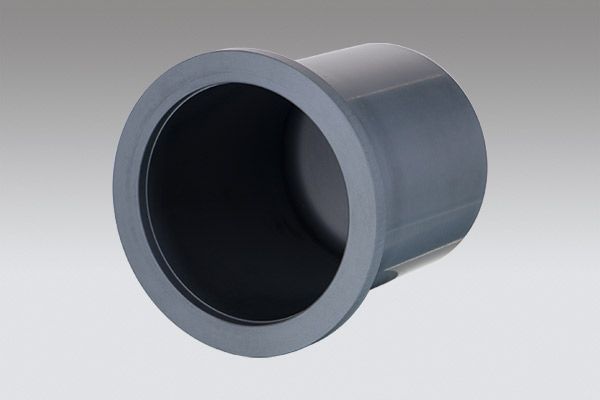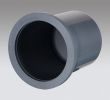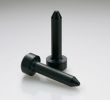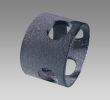Silicon carbide
Silicon carbide is a technical ceramic that can be found in nature in the form of crystals or produced artificially. It is a material with excellent thermal properties: in an inert atmosphere it can be used for applications at 2000 °C. It also offers good chemical stability and high wear resistance as well as semiconductor properties. We offer dense StarCeram® S silicon carbide. It can be used, for example, in the manufacture of superfinishing abrasives, in astronomy or in the jewellery industry.

The properties of silicon carbide
Silicon carbide is very rare in its natural state and is found in the form of crystals. In its natural state it is called moissanite. In order to develop its industrial applications, silicon carbide is also produced artificially by reducing silica with an excess of carbon or by heating silicon on carbon.
This material is very hard, with excellent oxidation resistance and high chemical stability. It is highly resistant to thermal shock and extreme temperatures: up to 1650 °C in air and 2000 °C in an inert atmosphere.
In addition, this technical ceramic offers very good sliding properties, which are useful for applications such as ball bearings. Silicon carbide is not an electrical insulator as alumina can be: it is a semiconductor.
| Material | Dense silicon carbide (SSiC) | Porous silicon carbide (SiC-R) |
| Microstructure | ||
| Composition (by weight) | > 98% SiC | > 99% SiC |
| Density | 3,1 | 2,7 |
| Open porosity (%) | < 3 | / |
| Mechanical properties | ||
| Compressive strength (MPa) | > 3000 | / |
| Fexural strength (MPa) | 450 | 80-100 |
| module of Elasticity (GPa) | 400 | 280 |
| Thermal properties | ||
| Maximum operating temperature (°C) | 1650-1900 | 2000 |
| Specific heat(J/Kg.K) | 1000 | / |
| Thermal conductivity at 100 °C (W/m.K) | 125 | 35 |
| Thermal conductivity1000 °C (W/m.K) | / | 26 |
| Coefficient of expansion (10-6/K) | 4,5 | 4,5 |
| Electrical properties | ||
| Resistance at 20°C (ohm.cm) | 107 | / |
| Electrical rigidity (kVeff/mm) | / | 280 |
What are the different types of silicon carbide?
We offer two types of Kyocera silicon carbide: StarCeram® S dense sintered silicon carbide and recrystallised porous silicon carbide. Dense sintered silicon carbide (SSiC) is particularly hard and offers good sliding properties and excellent wear resistance. It is therefore often used for applications such as ceramic ball bearings, axial bushings or plain bearings.
We also offer porous (recrystallised) silicon carbide of the SiC-R type. This material can be used at temperatures of up to 1650 °C in air and 2000 °C in an inert atmosphere. This excellent heat resistance allows it to be used as firing or sintering supports in industrial furnaces: trays and supports, posts and other sintering supports.
The products we offer in silicon carbide
There are no standard products in silicon carbide, we produce on demand according to drawings and customer specifications.
Silicon carbide parts are produced by cold isostatic pressing, green machining and gas pressure sintering. If tolerances are tight, or a polished surface is required, we can machine the silicon carbide after sintering using diamond tools.
Applications for silicon carbide
Silicon carbide is often used in the form of superfinishing tools: silicon carbide grains are particularly abrasive and can be used to produce grinding wheels and files of the required roughness, which are particularly effective for grinding and polishing hard materials.
The larger moissanite crystals can be used in jewellery, making good imitations of diamonds. Silicon carbide can also be used in high-temperature industrial furnaces as a firing medium, or in ball bearings. It is used in the automotive industry to make high-performance brake discs and in electronics for the manufacture of broadband semiconductors. It is also found as a ceramic plate in some bullet-proof waistcoats. It can also be used in laser systems such as laser scanning mirrors. Silicon carbide is also used in chemistry and pharmacy in continuous flow reactors.
Finally, silicon carbide is used in space and astronomy. Indeed, its high hardness and rigidity, its low coefficient of expansion and its high thermal conductivity make silicon carbide a material of choice for the manufacture of telescope mirrors and other instruments used in astronomy. Silicon carbide is ultimately used in a very wide range of fields.







